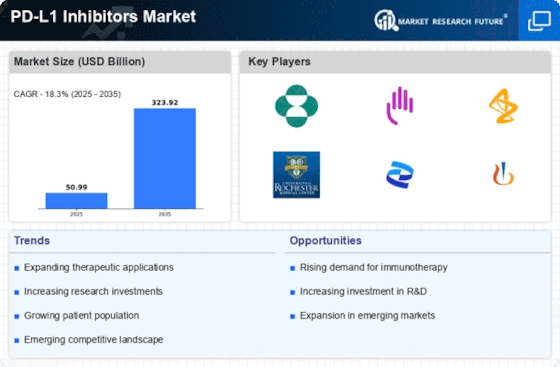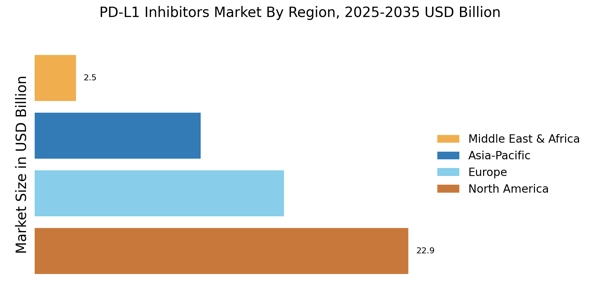Rising Incidence of Cancer
The increasing incidence of various cancers, particularly lung cancer and melanoma, is a primary driver for the PD-L1 Inhibitors Market. According to recent statistics, lung cancer remains one of the most prevalent forms of cancer, with millions diagnosed annually. This surge in cancer cases necessitates the development and availability of effective treatment options, including PD-L1 inhibitors.
As healthcare systems strive to address this growing burden, the demand for innovative therapies is likely to escalate. The PD-L1 Inhibitors Market is poised to benefit from this trend, as these inhibitors have shown promising results in clinical trials, leading to their approval for multiple indications. Consequently, the market is expected to expand significantly, driven by the urgent need for effective cancer therapies.
Advancements in Immunotherapy
The PD-L1 Inhibitors Market is experiencing substantial growth due to advancements in immunotherapy. This innovative approach harnesses the body's immune system to combat cancer, and PD-L1 inhibitors play a crucial role in this paradigm shift. Recent developments in the understanding of immune checkpoints have led to the identification of PD-L1 as a key target for therapeutic intervention.
As a result, several PD-L1 inhibitors have gained regulatory approval, contributing to a robust pipeline of new treatments. The market is projected to witness a compound annual growth rate (CAGR) of over 15% in the coming years, reflecting the increasing adoption of immunotherapy in oncology. This trend underscores the potential of PD-L1 inhibitors to revolutionize cancer treatment, thereby driving the market forward.
Increasing Awareness and Education
Increasing awareness and education regarding cancer treatment options are driving the PD-L1 Inhibitors Market. As healthcare professionals and patients become more informed about the benefits of immunotherapy, the demand for PD-L1 inhibitors is likely to rise. Educational initiatives aimed at both clinicians and patients are emphasizing the importance of early diagnosis and the availability of advanced treatment modalities.
This heightened awareness is fostering a more proactive approach to cancer treatment, leading to increased utilization of PD-L1 inhibitors. Moreover, patient advocacy groups are playing a pivotal role in disseminating information about these therapies, further contributing to market growth. As awareness continues to expand, the PD-L1 Inhibitors Market is expected to thrive, reflecting a shift towards more informed treatment decisions.
Growing Investment in Cancer Research
Investment in cancer research is a significant driver for the PD-L1 Inhibitors Market. Governments and private organizations are allocating substantial funds to explore novel therapeutic options, including immunotherapies. This influx of capital is fostering innovation and accelerating the development of PD-L1 inhibitors. For instance, funding for clinical trials has increased, allowing researchers to evaluate the efficacy and safety of these inhibitors in diverse patient populations.
As a result, the number of PD-L1 inhibitors entering the market is expected to rise, enhancing treatment options for patients. Furthermore, collaborations between pharmaceutical companies and research institutions are likely to yield breakthroughs in the understanding of cancer biology, further propelling the PD-L1 Inhibitors Market. This trend indicates a promising future for the market as new therapies emerge.
Regulatory Support for Innovative Therapies
Regulatory bodies are increasingly supportive of innovative therapies, which is a key driver for the PD-L1 Inhibitors Market. The expedited approval processes for breakthrough therapies have facilitated the entry of PD-L1 inhibitors into the market. Regulatory agencies are recognizing the urgent need for effective cancer treatments, leading to faster review times and approvals for promising candidates. This supportive environment encourages pharmaceutical companies to invest in the development of PD-L1 inhibitors, knowing that their products may reach the market more swiftly. As a result, the PD-L1 Inhibitors Market is likely to see a surge in new product launches, enhancing competition and providing patients with more treatment options. This trend reflects a broader commitment to improving cancer care through innovative therapies.

















